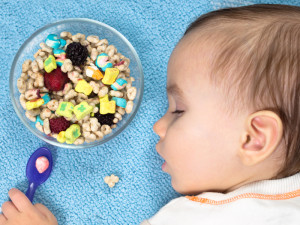Will Starting Solid Foods Make My Baby Sleep Through the Night?
/ {Guest Post at Love Child Organics} Exhausted parents often ask me: “Will starting my baby on solid foods make her sleep through the night?” I understand why Moms and Dads (desperate for some sleep) grasp on to this myth. However, it is a myth. Feeding your baby solid foods won’t make your baby sleep through the night.
{Guest Post at Love Child Organics} Exhausted parents often ask me: “Will starting my baby on solid foods make her sleep through the night?” I understand why Moms and Dads (desperate for some sleep) grasp on to this myth. However, it is a myth. Feeding your baby solid foods won’t make your baby sleep through the night.
Does Starting Solid Foods Make Baby Sleep?
It’s true that some babies start sleeping for longer stretches through the night at about the same time that they start solid foods. But it’s not that the solid foods have caused the sleeping. It’s that for many babies, the developmental stage when we start to feed them solid foods coincides with the developmental stage when they start sleeping for longer periods of time. Sorry exhausted Moms and Dads, it’s not the solid foods causing longer sleep.
While I’m at it busting myths related to starting solid foods, I’ll take the opportunity to address a couple more.
Do Big Babies Need Solid Foods Early?
Myth: Big babies need to be fed solid foods early. This is false. There’s no evidence to support starting solids early for babies who are at the top end of the growth curve. Breast milk and formula are very rich. And, your baby is likely an expert at breastfeeding or formula feeding by this age. Therefore, continuing exclusively breastfeeding or formula feeding until about 6 months is recommended (the same as average-size babies).
Do Small Babies Need Solid Foods Early?
Myth: Small babies need to be fed solid foods early. This is also false. There’s no evidence to support starting solids early for babies who are on the small end of the growth curve. As I mentioned above, breast milk and formula are very rich and your baby is an expert at breastfeeding or formula feeding by this age. So continue to exclusively breastfeed or formula feed your baby until about 6 months (the same as average-size babies).
In summary, starting solids early won’t provide big babies or small babies with extra nutrition. Nor will it make your baby sleep through the night. Introduce solid foods when your baby is about 6 months old.
Ready to start your baby on solid foods? Here's how to start your baby with purees or Baby Led Weaning (BLW)



